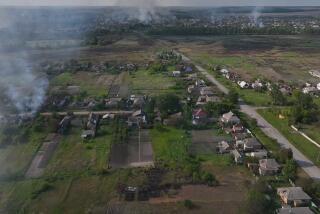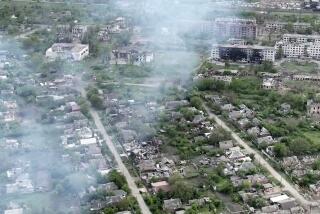Despair Takes Up Residence in Grozny’s Ruins
- Share via
GROZNY, Russia — In a near-deserted street, amid the ruin of war, a lone woman struggles with two bags containing the small fragments of family life--the most useful, practical belongings, not the treasured, sentimental things.
At times like this, there is no room for warm memories. Zina Askhabova just does what she can to survive.
After the bombing began several weeks ago, Askhabova and her family fled Grozny, the Chechen capital, and took refuge in the neighboring Russian republic of Ingushetia. But twice she has come back, consciously risking her life to recover a few everyday objects from her apartment, each time expecting to find a heap of ruins.
“There is no longer a happy moment in my life. I don’t know if this fear will ever go away, even after this war is over,” says Askhabova, 37. “It is very frightening to be here, and it is even more frightening to be on the road. Russian planes come out of nowhere, and they bomb and shoot everything that moves.
“I know that today or tomorrow a bomb might fall on my head.”
She pushes on, fending off despair with small and practical actions.
After weeks of heavy bombing, central Grozny is almost empty of people and cars. The bombed-out windows of apartment buildings stare vacantly out. The place is populated by ragged stray dogs that families turned loose before they fled.
In the suburbs of the city, a man with two cows has decided to remain, whatever happens. Yusup Magomedov, 63, stayed put right through the last war with Russia, in 1994-96, the only one on his street to do so.
He has stored up fodder for his cows. There is no gas to cook with, no power, no water and no heat. Every day he goes to the river with a wheelbarrow, hauling back a barrel of water.
“I hope I don’t look like a target,” he says. “But even if I do, I don’t care anymore. I’m dead tired of being afraid all the time.”
Grozny was home to half a million people before the first war and it housed several hundred thousand before the fighting returned to this separatist republic in September. Russian generals, who lost three years ago, are determined to win this time.
Moscow’s forces pushed into Chechnya in late September, after a series of bombings of apartment blocks in Russia that Kremlin leaders blamed on Chechen guerrillas. The invasion also was in reprisal for Chechen guerrilla attacks on the neighboring Russian republic of Dagestan in the summer. Russia’s stated aim is to destroy Grozny. Last week, a Kremlin official said there would be no point in rebuilding the city after the war and that the capital would be moved to Gudermes, Chechnya’s second-biggest city, which fell to Russia last week.
A dark and sorrowful history hangs over Grozny. It took its name from the Russian fort built in 1818 by Gen. Alexei Yermolov, who was given the task of subduing the Caucasus by Czar Alexander I. The name, meaning “terrible,” was supposed to instill fear in the hearts of the mountain people.
In the 1994-96 war, it was the Russians who tasted the terror of Grozny. On New Year’s Eve five years ago, hundreds of green young troops died in the bungled storming of the city to oust the Chechen rebels. In August 1996, when the Russians held Grozny, Chechen fighters suddenly swamped the city, surrounded the Russians and fought them to a standstill.
This time, Russian military leaders insist that there will be no storming of Grozny. The plan is to raze the city with bombs and massive rockets, destroying the Chechen fighters from the air. But at some point, the Russians will have to enter the ruins, as they did in Gudermes last week, after the remaining fighters there had withdrawn.
“I guess we have done our share of retreating this year,” says Kerim Khatuyev, 24, a Chechen fighter in Grozny. “This is where we are going to stay, no matter what.”
Khatuyev’s unit fought the Russians in northern Chechnya for several weeks before pulling back to the capital. He is certain the Russians will eventually storm Grozny and is determined to be there to meet them.
“I’m sure they’ll come,” he says, “and when they do, we’ll give them hell.”
For the fighters digging in to defend the city, it is safer outside in deep trenches than in basements under buildings that might collapse under bombs.
Tirko Chatakov, 32, a fighter digging a trench outside a half-ruined apartment block, says the Russians are bombing any building still standing. “During the last war, we didn’t have to do much digging,” he says. “This time it’s different. We’re not wasting our time here. We are digging in real hard.”
He says it is a war of nerves, waiting for the Russians to attack.
There are no functioning hospitals in Grozny. The closest is at Stariye Atagi, eight miles to the south, where 10 surgeons from Grozny hospitals work, operating up to 24 hours a day on a table that is almost never vacant.
“All the doctors and nurses work for free. What can I say? They are real heroes,” chief physician Aslanbek Dukuzov says. The hospital receives at least 20 injured people a day, he says, nearly all civilians, many of them hit in their cars by Russian attack planes, others shot while collecting firewood.
The surgery has facilities for 30 people and accommodates 62. Most are treated and sent on to hospitals across the border, in Ingushetia.
“We are badly overcrowded here and lack the most essential drugs and medicines. Many injured people die on the road to Ingushetia because the roads are so badly clogged with streams of refugees,” Dukuzov says. “But there is very little we can do here, for lack of proper conditions.”
Dukuzov says eight people died when attack planes strafed four cars near Grozny over the weekend and that many others were injured.
In Argun, six miles east of Grozny, Sultan Khasiyev saw his neighbors die when Russian planes attacked Saturday. Advan Satuyev died instantly when his brick house took a direct hit, but his wife, Zina, was alive. For four hours, Khasiyev and others struggled to save her from the rubble.
“All the time we were trying to rescue her, she was screaming in pain. As soon as we finally freed her, she died,” Khasiyev says. The couple’s four children, ranging in age from 6 to 13, were outside when the bomb hit. They’ve been sent to live with relatives.
When war comes, people go on as best they can, trying to live normally. Small boys play soccer while warplanes soar overhead.
On Oct. 22, just before his 14th birthday, Yusup Magomadov was playing soccer with 19 other boys in his village of Novy Sharoi. A bomb fell in the center of the field, killing at least seven boys instantly and injuring Yusup and others.
The local doctor had no antibiotics, and after basic treatment advised Yusup’s mother, Lola, to take the boy to a hospital in Ingushetia. But the Russian military had blocked the border, trapping tens of thousands of refugees inside Chechnya.
So for five days the boy had to wait in a basement, his pain growing worse as gangrene set in. Eventually, the local doctor, operating in the basement, took both legs off at the knees.
Telling the story beside her son in the Ingushetian hospital at Sleptsovskaya, near the Chechen border, Lola Magomadov looks gray, drawn and thin. Her daughters, ages 8, 10 and 16, are still in Chechnya with friends. After she fled with her son, her house was bombed and her cattle killed.
“My whole life is crumbling,” she says. “I feel I could die, but who would look after my children?”
Among those killed on the soccer field was Salman Dzhavbatyrov. His younger brother, Sultan, 9, who was also playing that day, has shrapnel wounds in his legs. Russian officials from the Ministry of Emergency Situations offered to fly him to Moscow for treatment.
But Sultan’s pain has turned to hatred. “I said I didn’t want to go to Moscow,” he says defiantly, “the place which sent the bombs that killed my brother, my friends and injured me.”
(BEGIN TEXT OF INFOBOX / INFOGRAPHIC)
Noose Tightens Around Grozny
Russia vows it will not back off from its assaults in Chechnya until rebel fighters are wiped out. Russian troops took new territory in the east and west as they encircled Grozny, the Chechen capital.
Source: Associated Press
*
Special correspondent Nunayev reported from Grozny and Times staff writer Dixon reported from Moscow.
More to Read
Sign up for Essential California
The most important California stories and recommendations in your inbox every morning.
You may occasionally receive promotional content from the Los Angeles Times.













